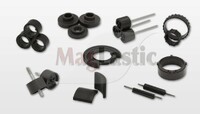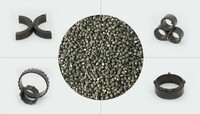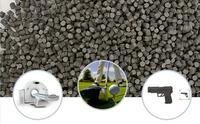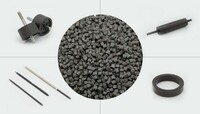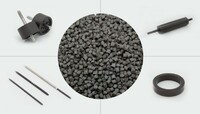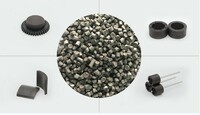Permanent Magnet Materials Are Used in Motors
Specifications
Permanent magnets are widely used in our lives. Many people are curious about what are made out of permanent magnets? Most permanent magnets are used in the manufacture of various types of
permanent magnet motors, the large ones are exciters, auxiliary exciters, generators in airplanes; the small ones are floppy and hard drive motors used in computers, printing motors, VCD and DVD CD
motors, bicycle motors and car motors, hundreds of millions of toy motors and so on. These are all the examples of permanent magnets in everyday life.
The earliest invented motor used permanent magnets to provide magnetic flux to the air gap between the rotor and the stator. At that time, the energy density of permanent magnet materials was very
small, and the power (output) of the motor was too small to meet the requirements, so people turned to current to generate magnetic flux. The torque of a motor is proportional to the current and
also proportional to the magnetic flux. The power of the motor is equal to the product of the torque and the speed. Using current to generate magnetic flux consumes more electrical energy, while
using permanent magnets to provide magnetic flux can save electrical energy. Therefore, with the progress of permanent magnet materials, there are more and more permanent magnet motors. Recently,
with increasing calls for environmental protection and energy conservation, some countries have been researching and developing permanent magnet motors for electric vehicles to replace ordinary
motors below 500kW.
The permanent magnets used in permanent magnet motors are mainly sintered and injection molded. In order to reduce weight and improve efficiency, small and micro motors with lower power generally
choose injection molded permanent magnets. Injection molded ferrites are also easy to shape design to meet Motor use requirements.
During the operation of the motor, the permanent magnet is periodically subjected to the demagnetizing field; at the same time, the energy loss of each part of the motor eventually becomes heat,
which makes the temperature of the motor reach a high temperature when it reaches a thermal equilibrium. Therefore, the permanent magnet material used in the motor must have a high intrinsic
coercivity and critical magnetic field.
During the operation of the motor, the centrifugal force received by the permanent magnet is very large. Centrifugal force is tensile stress, and the tensile strength of permanent magnet materials
is not high. In this regard, people have made efforts in two aspects:
(1) The compressive stress on the permanent magnet is greater than the tensile stress in the motor structure;
(2) The tensile strength of the injection molded permanent magnet is greater than that of the sintered permanent magnet, and many motors adopt it.
If you want to know different types of magnets and their properties or more, contact us.
- Country: China (Mainland)
- Business Type: Manufacturer
- Market: Africa,Americas,Asia
- Address: Block C, Building 1, NO.63, Jiuhuan Road, JiangGan District, Hangzhou
- Contact: maglastic .com

